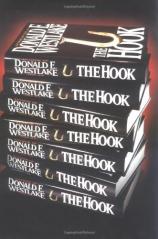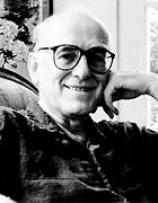Interview: April 21, 2000
April 21, 2000
Prolific author Donald E. Westlake, often referred to as the Mystery grand master, is back again with his latest thriller, THE HOOK. Not simply a mystery, THE HOOK, like his recent book THE AX, is full of psychological suspense. Bookreporter.com's Senior Writer Joe Hartlaub has followed Westlake's career through the years, reading Westlake and his infamous pseudonym, Richard Stark. Delve into Donald's dark world with Joe as your guide in this interview.
TBR: Your first book, THE MERCENARIES, was published in 1960. This year marks your 40th year of publishing with the publication of your latest novel, THE HOOK. What are the most significant changes that you have seen in the business of writing and publishing in the past 40 years?
DW: All of the changes in publishing since 1960 are significant. There are far fewer publishers. The many magazines, ranging from pulp to slick, that used to serve as both farm teams for writers and lures to readers, with hundreds of short stories every month, don't exist. Most of the doors for new people have been sealed. On the positive side, the mystery genre has gained astonishing respect. Of the 8 publishers in hardcover that regularly did mysteries in 1960, the editors at 7, assigned to mysteries, were also the cookbook editors.
TBR: The underpinning of your new novel THE HOOK --- the tyranny of the computer over the book-publishing business --- rings too true to be fiction. Was that particular aspect of THE HOOK drawn from personal experience?
DW: I never directly draw fiction from personal experience, though I do absorb what I see and use some of it in different ways. A few writer friends of mine have had their careers under bombardment the last few years, which obviously I observed from a there-but-for-the-grace-of-God-go-I perspective.
TBR: One of the most enjoyable aspects of THE HOOK, for me, was the reproduction of Bryce Proctorr's outlines in which you not only showcase the deterioration of the man as a writer; but gently satirize the action-adventure literary genre. Do you by any chance have a completed, unpublished novel based on one of these outlines lurking in the wings? If so, will it ever see the light of day?
DW: Anybody who can turn one of Bryce's outlines into a completed novel wins a prize yet to be named. Those outlines are the equivalent of a room after the hand grenade goes off. The lamp and the chair and all the rest are still there, but not coherent.
TBR: Your book THE AX, a thriller now in paperback, is the chilling story about a downsized executive so desperate to get a job he decides to "off" his competition. The scariest thing about this book is that you almost believe the character's rationalizations for killing his peers. What was your inspiration for this cynical plot?
DW: There is nothing cynical about THE AX. As THE HOOK came from observing other people nailed to the floor, so did THE AX. A friend of mine, now retired, was then a major exec at a major bank, and one of her jobs, the last four years, was the farewell interview. What rose mostly from her stories was sadness, the spreading sadness of people being forcibly divorced from their lives. I have read, and believe, that anger is sadness projected outward. I thought, what if somebody turned that sadness into anger, not in a Polish-cavalry-against-the-Nazi-tanks heroic suicide way, but in a productive way? THE AX came from that.
TBR: What made you gravitate toward writing as a profession?
DW: My father wanted me to be an architect. The one thing I learned was that the kitchen and bathroom should be near each other, to simplify the plumbing. Nothing about it interested me. Or about anything else, except making up stories. If literacy weren't so nearly universal, God knows what I'd be. A drain on the State, I shouldn't wonder.
TBR: Your Parker novels have enjoyed a loyal following that has endured and in fact grown over the years. Will we be seeing any Parker novels from Richard Stark in the near future?
DW: You will see FLASHFIRE from Richard Stark, set partly in Palm Beach, in October or November, I forget which. You will see FIREBREAK by Richard Stark roughly a year after I finish it, which will be some time after I finish this.
TBR: You have been amazingly prolific over the course of your career. Could you share your work schedule with us?
DW: My work schedule has changed over the years. The one constant is, when at work on a novel, I try to work seven days a week, so as not to lose touch with that world. Within that, I'm flexible on hours and output. I used to be less flexible, but realized there was no point pushing myself, I was going to do it whether I cracked a whip over me or not. In my 20s and 30s I usually wrote at night, roughly 10 PM to 4 AM, alone in my lit room, like a solitary balloon sailing through the night. I loved it, but social reality impeded. Now I wander in here at 9 in the morning or so, and come back for a while in the afternoon. I am a very lenient boss.
TBR: Are you working on anything now?
DW: I am working on FIREBREAK, though at the moment I'm confused about what happens next in there. This is a good moment to clear the brain by thinking about something else. You, for instance. Thank you.
TBR: What authors have influenced your work?
DW: Lord, what authors have not influenced my work? Some have shown me errors I might have made if they hadn't made them first, for which I'm so grateful I won't mention their names. Others have wowed me with specifics: Theodore Sturgeon, Peter Rabe, Anthony Powell, many more. When I was 14 or 15 I read Hammett's THE THIN MAN (the first Hammett I'd read), and it was a defining moment. It was a sad, lonely, lost book, that pretended to be cheerful and aware and full of good fellowship, and I hadn't known you could do that. Seem to be telling this, but really telling that. Three-dimensional writing, like three-dimensional chess. Nabokov was the other master of that. You could learn something from Nabokov on every page he ever wrote.
TBR: What are you reading now?
DW: At the moment I'm reading STRANGE FRUIT, a fascinating history of that song and of Billy Holiday's link to it. Before that I read UNTOUCHABLE by John Banville, a terrific fictional retelling of the Anthony Blunt story. And before that THE WILD PARTY, the 1928 novel in rhyme by Joseph Moncure March that everybody but me right now is turning into a musical.
TBR: To date, what is your favorite novel that you have written?
DW: I always like the most recent novel best, because it's still vivid. However, not to waffle, my overall self-favorite is KAHAWA, because it kept getting bigger than it was supposed to be, and I kept following it, and I think I was fairly brave not to run away from it.
TBR: What advice would you give to aspiring writers?
DW: Sorry; I have no space left for advice. Just do it.




